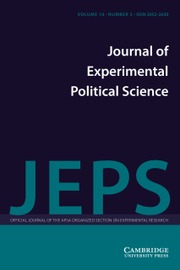- ISSN: 2052-2630 (Print), 2052-2649 (Online)
- Frequency: 3 issues per year
The Journal of Experimental Political Science (JEPS) features cutting-edge research that utilizes experimental methods or experimental reasoning based on naturally occurring data. JEPS embraces the variety of experiments conducted in social science research, including survey, laboratory, field, natural, and neurological experiments. The journal publishes four types of articles: 1) Research Articles (4000 words) that report novel empirical findings grounded in social science theory; 2) Short Reports (1000 words) that concisely summarize empirical findings, primarily to inform best practices, measurement strategies, or innovations in experimental design; 3) Replications (3000 words) of previous experiments; and 4) Meta-Analyses (3000 words) of a well-defined set of experiments.
Content preservation
Cambridge University Press publications are deposited in the following digital archives to guarantee long-term digital preservation:
- CLOCKSS (journals)
- Portico (journals and books)
